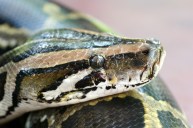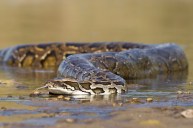Just like pythons in Florida, experts say that dog-sized lizards pose a growing threat to ecosystems in the South. It's all do to their ravenous appetite.
The Argentine black and whit tegu has garnered a reputation for eating truly anything. University of Florida wildlife professor Frank Mazzotti told The Palm Beach Post that's a major problem. You see, the giant lizards have been known to eat turtles, chickens, and even turkeys. They've also been known to dine on bird and alligator eggs.
It wouldn't be a surprise even if it was a shock to you to find one of the lizards dining on your dog or cat food. This insatiable appetite makes them a major threat to ecosystems in the South. So far, they've spread to Florida, Texas, Georgia, South Carolina, and also Maryland.
'"Because they can live in many more places and eat everything, there is not going to be a whole lot to stop them,' Mazzotti said.
"It doesn't seem like we've learned a lesson from our experience with pythons," he also added. "If you wait until you see the impact an animal is having, it's too late."
Dog-Sized Lizards In America
So how many giant lizards are we talking? Scientists don't even know the exact number of the animals. But since 2002, there have been more than 10,000 sightings across the East Coast. It seems they originated in America in the Florida Everglades before spreading elsewhere.
Tegues can thrive in a variety of environments, according to Bryan Falk, a supervisory invasive species biologist at Everglades National Park.
"They are happy in many different environments, whether that is a natural or disturbed habitat. We once had a report of a tegu living in a dryer vent in someone's house in Homestead," he said.
Combine that with their appetite and you have a double threat.
"This is the first critter I've ever worked with that eats everything, truly everything," Mazzotti said. "Because they can live in many more places and eat everything, there is not going to be a whole lot to stop them."
We very well could be looking at another python situation.
"Research and risk assessments conducted show that tegus have a high potential to become the next Burmese python in Florida," said Larry Williams, Florida ecological services state supervisor for USGS.




